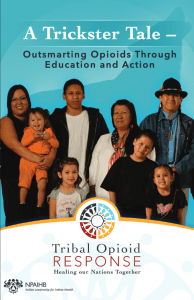To develop health promotion messages and campaigns that resonate with AI/AN communities, our team uses social marketing, an evidence-based planning process that improves the impact of health promotion messages. The model uses formative research to identify priority populations, segment the community into distinct audiences, pretest messages, materials and strategies with the audience, and then monitors the campaign to assess its effectiveness.
We’ve used this community-driven process to design social marketing campaigns addressing health topics important to AI/AN communities, including:
- Drug and Alcohol Use
- Sexual Assault
- HIV Testing
- Hepatitis C Testing and Treatment
- Suicide Prevention
- Flu and Immunizations
Please feel free to download, print, or pass on any of our campaign materials. Or use the campaign logos on your own shirts and promotional materials.
Suicide and Crisis Lifeline
- Postcard – Text Indigenous
- Business card – Text Indigenous
- Business card 2 – Text Indigenous
- Social Media Banner – Text Indigenous
- Social Media Square – Text Indigenous
The We Are Connected, #WeNeedYouHere campaign is starting to be improved in 2021! This campaign originated in 2015 and strives to encourage youth to identify suicide warning signs and seek help. We encourage communities to print out the “Blank Poster,” add your own words of encouragement and then post it to social media with #WeNeedYouHere.
- We Are Connected Blank Poster JPEG
- We Are Connected Blank Poster PDF
- We Are Connected 2 Person Poster
- We Are Connected 4 Person Poster
- We Are Connected_Rack Card
- We Are Connected_TipCard
- We Are Connected Radio PSA 1
- We Are Connected Radio PSA 2
- Video PSA Lived Experience 1
- Video PSA Lived Experience 2
- Video PSA Lived Experience 3
You Protected Us. Let Us Walk with You. With funding from the Substance Abuse and Mental Health Services Administration’s (SAMHSA) Garrett Lee Smith youth suicide prevention grant, the THRIVE project at the NPAIHB is pleased to announce the availability of AI/AN veteran suicide prevention social marketing materials. Please feel free to download, print, or pass these materials along.
The LGBTQ – Two Spirit, Loved & Accepted. #WeNeedYouHere campaign encourages people to learn about the different gender and identities historically found in their Tribe(s). This campaign shows love, acceptance, and support for anyone identifying as Lesbian, Gay, Bisexual, Transgender, Queer, and/or Two Spirit. Please download, print, and pass on these amazing materials.
The Community is the Healer that Breaks the Silence campaign launched in 2010 and has since been discontinued in 2011. It encourages community members to initiate conversations about suicide, to help start a dialogue and support those at risk. We still encourage you to use these resources if they fit for your community but these resources are no longer being updated.
- Factsheet pdf
- Poster—Idaho pdf
- Poster—Washington pdf
- Poster—Oregon pdf
- Poster template—Idaho pdf
- Poster template—Washington pdf
- Poster template—Oregon pdf
- Flier template—Idaho pdf
- Flier template—Washington pdf
- Flier template—Oregon pdf
- Flier factsheet template pdf
- 1/2 page factsheet template pdf
- 1/2 page factsheet template pdf
- Window cling template pdf
Caring Messages campaign strives to provide caring messages to provide a thoughtful text to brighten your day and shift your perspective. These are messages designed to improve your mood and remind you how awesome you are.
Mind4Health is a text message service for caring adults that builds their capacity to facilitate conversations with youth to nurture mental health.
The Stand Up, Stand Strong campaign launched in 2012. It empowers youth to stand up against bullying.
- Bullying Poster (All)
- Bullying Brochure.pdf
- Bullying Fact Sheet.pdf
- Cyber Bullying Brochure.pdf
- Bullying Poster ID Template
- Bullying Poster KS Template
- Bullying Poster MN Template
- Bullying T-Shirt Template
- Bullying Lanyard
- Bullying 728x90_Web Banner (pdf)**
- Bullying 125×125 Web Banner (ai)**
**The web banners can be used on your own webpage. You can hyperlink it to the THRIVE webpage or to another bullying prevention webpage such as: www.stopbullying.gov.
The I Strengthen My Nation campaign launched in 2012. It empowers Native youth to resist drugs and alcohol and encourages parents to talk openly with their children.
- Logo – I Strengthen My Nation
- Factsheet
- Male poster
- Female poster
- Brochure (parent version)
- Brochure (teen version)
- Window cling template
- Lanyard template
- T-shirt template
- Video PSA – 2:14 Long
- Video PSA – :31 Short
We encourage you to print out the logo, have youth add their own words or pictures describing how they “Strengthen their Nation,” and then post it to social media using #WeRNative.
The My Body, Mind, and Spirit are Sacred campaign was designed to address and prevent sexual assault.
- Logo
- Rack Card *2023 UPDATE*
- Community Poster 1 *2023 UPDATE*
- Community Poster 2 *2023 UPDATE*
- Male Poster *2023 UPDATE*
- Tip Card *2023 UPDATE*
- Radio PSA
- T-shirt template
- USB drive template
The What is Done to One is Felt by All campaign was designed to prevent family maltreatment, including child abuse, elder abuse, and intimate partner violence.
- Elder Abuse Prevention PSA
- Elder Abuse Poster
- Elder Abuse Rack Card
- Elder Abuse Tip Card
- Child Maltreatment Poster
- Child Maltreatment Rack Card
- Child Maltreatment Tip Card
- Intimate Partner Violence Prevention PSA
- Intimate Partner Violence Poster
- Intimate Partner Violence Rack Card
- Intimate Partner Violence Tip Card
- T-shirt template
- USB Drive template
The PrEP Training for Community and Public Health Staff is a Learning Path for providers who see American Indian/Alaska Native (AI/AN) clients. Pre Exposure Prophylaxis, or PrEP, is a powerful biomedical tool that can help prevent new cases of HIV, yet many providers know little about it, and do not discuss it with their clients. This is especially true for staff who work within or are associated with the Indian Health Service (IHS) system of care and who see American Indian/Alaska Native (AI/AN) clients. PrEP Training for Community and Public Health Staff is a series of courses that aim to increase knowledge and awareness of the benefits of PrEP.
The Native. Tested. Proud. campaign encourages routine HIV testing for everyone 13-64 years old. Funds for the project were provided by the Substance Abuse and Mental Health Services Administration’s (SAMHSA) Minority AIDS Initiative (MAI) and the Indian Health Service.
Campaign logos:
- Plain – Native Logo: ai version
- Plain – Native Proud Tested Logos: ai version PDF version
- Feather – Native Tested Proud Logos: ai version PDF version
- NDN Tested Logos: ai version PDF version
Other Outreach Materials:
- Poster—Adult: PDF Version
- Poster—Teen: PDF Version
- Flier – Adult: PDF version
- Flier – Teen: PDF version
- Radio Public Service Announcement (PSA) – Adult: mp3 file
- Radio Public Service Announcement (PSA) – Teen: mp3 file
- Snag Bag Insert (for placement on Business Cards): PDF version
- Window Cling – Adult (7.5 x 3.75): PDF version
- Window Cling – Adult (7.5 x 3.75): PDF version
- Web Banner Ad – Native Tested: GIF format
- Print Ad – Adult – I know my status: PDF version
- Print Ad – Teen – I know my status: PDF version
The Native. LGBT. Proud. campaign was designed to reduce stigma and promote HIV testing among AI/AN LGBTQ Two Spirit community members. Funds for the project were provided by the Minority AIDS Initiative (MAI) and the Indian Health Service.
These STD Testing educational materials were designed to support school-based chlamydia screening events hosted by the NW Tribes.
Been Laid? Get Tested!
- Logo (for placement on shirts and other promotional materials): Logo
- Flier (for placement in schools): Flier
Just because you can’t see it, doesn’t mean you don’t have it!
- Logo (for placement on shirts and other promotional materials): Logo
- Flier (for placement in schools): Flier
- Post Card (for community outreach or clinic reminders): PostCard
P2B STD Free
Hepatitis C is everybody’s responsibility. With American Indian and Alaska Natives having the highest mortality rate from hepatitis C of any race or ethnicity, it is time to make a decision to get actively involved, raise awareness and care for ourselves and the ones we love. Whether that means getting tested for Hepatitis C, educating others about new treatment options, or learning about how you can protect yourself from getting the virus, it is important that Hepatitis C is a topic that’s talked about. Hepatitis C is not something that’s going to go away, unless we all get involved and eliminate the disease. It’s not just doctor’s, or people living with Hepatitis C, and it’s not just your, or your family’s-it is everybody’s responsibility to prevent, treat and cure Hepatitis C.
For more information about Hepatitis C, click on the resources below or contact David Stephens, RN, dstephens@npaihb.org
- Video PSAs
- Print Media Campaign
- Posters
- Pamphlet
- Rack card
- Handout: hepatitis C test, treat, cure (all ages)
- Handout: hepatitis C baby boomers (born from 1945-1965)
As a part of the Generation Indigenous (Gen-I) initiative, NPAIHB trains AI/AN youth from across the U.S. in leadership skills, social marketing, and health activism. The workshops are 2 full days to engage and educate participants about youth-driven social marketing campaigns designed to prevent youth suicide and substance abuse and promote cultural identity and resilience. Here is some of the work created for Native youth, by Native youth.
Suicide Prevention
- Dreamcatcher
- Suicide Warning Signs 1
- Suicide Warning Signs 2
- Suicide Warning Signs 3
- Suicide Prevention Audio PSA
Culture
Substance Abuse Prevention
Tribal Opioid Health Education Media Campaign. The Tribal Opioid Health Education Media Campaign is a culturally-specific campaign for American Indian and Alaska Native communities. The campaign aims to increase understanding of opioid use disorder, decrease stigma associated with opioid use disorder, and provide people with opportunities to begin conversations and seek help with addiction. This project was made possible with funding from the SAMHSA Tribal Opioid Response grant. Please feel free to download, print, or share these materials.
For more information about NPAIHB’s opioid projects, click on the resources below or contact Megan Woodbury, Opioid Project Coordinator, mwoodbury@npaihb.org
Tribal Opioid Response Videos
Tribal Opioid Response – Healing Ourselves and Our Communities
This video was created for tribal community members to learn more about preventing, treating, and recovering from opioid use disorder.
Tribal Opioid Response – Healing Our Patients with Opioid Use Disorder
This video was developed for healthcare providers working with American Indian and Alaska Native (AI/AN) people. Watch to gain clinical insight about effective strategies for treating opioid use disorder and supporting AI/AN patients walk the road to recovery.
didgʷálič Wellness Center Video
The didgʷálic (deed-gwah-leech) Wellness Center – owned and operated by the Swinomish Indian Tribal Community – is a multi-specialty community health organization that provides counseling, medication, primary care, and social services to both Native and non-Native patients with substance use and behavioral health disorders. Through applying community knowledge and evidence-based medicine, didgʷálic has helped turned the tide of the epidemic at Swinomish. Watch this video to learn more about the didgʷálič Wellness Center’s unique treatment model. To learn more visit: didgwalic.com.
All videos were produced by the Northwest Portland Area Indian Health Board (NPAIHB) Tribal Opioid Response Project, which is dedicated to providing important resources to prevent opioid misuse, helping those in treatment, and empowering American Indian and Alaska Native community members with knowledge so they can protect themselves and their loved ones.
The creation of safe, inclusive, and welcoming spaces is critically important to provide holistic wellness for2SLGBTQ (Two Spirit, lesbian, gay, bisexual, transgender, and queer/questioning) community members. A safe space is a place, program, or community that is intentionally working to affirm 2SLGBTQ identities. For many Native youth, having the knowledge that 2SLGBTQ allies exist across their tribal community can help create a welcoming and safe environment. Creating welcoming spaces is a continual process; one that requires accountability and buy-in from everyone who create the space and access it. There are several ways we can create welcoming spaces, especially in the clinical and educational environments.
Loved Here, Safe Here. – Materials for tribal clinics and those who engage with Native youth to support and provide an affirming environment for the 2SLGBTQ community.
Social Media Materials: Feel free to download and share on your digital platforms and social media channels:
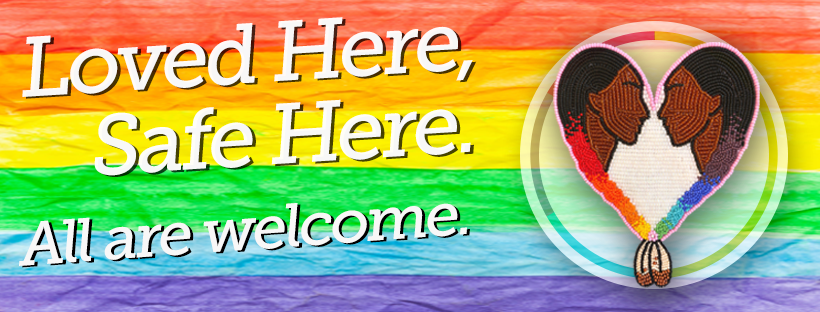
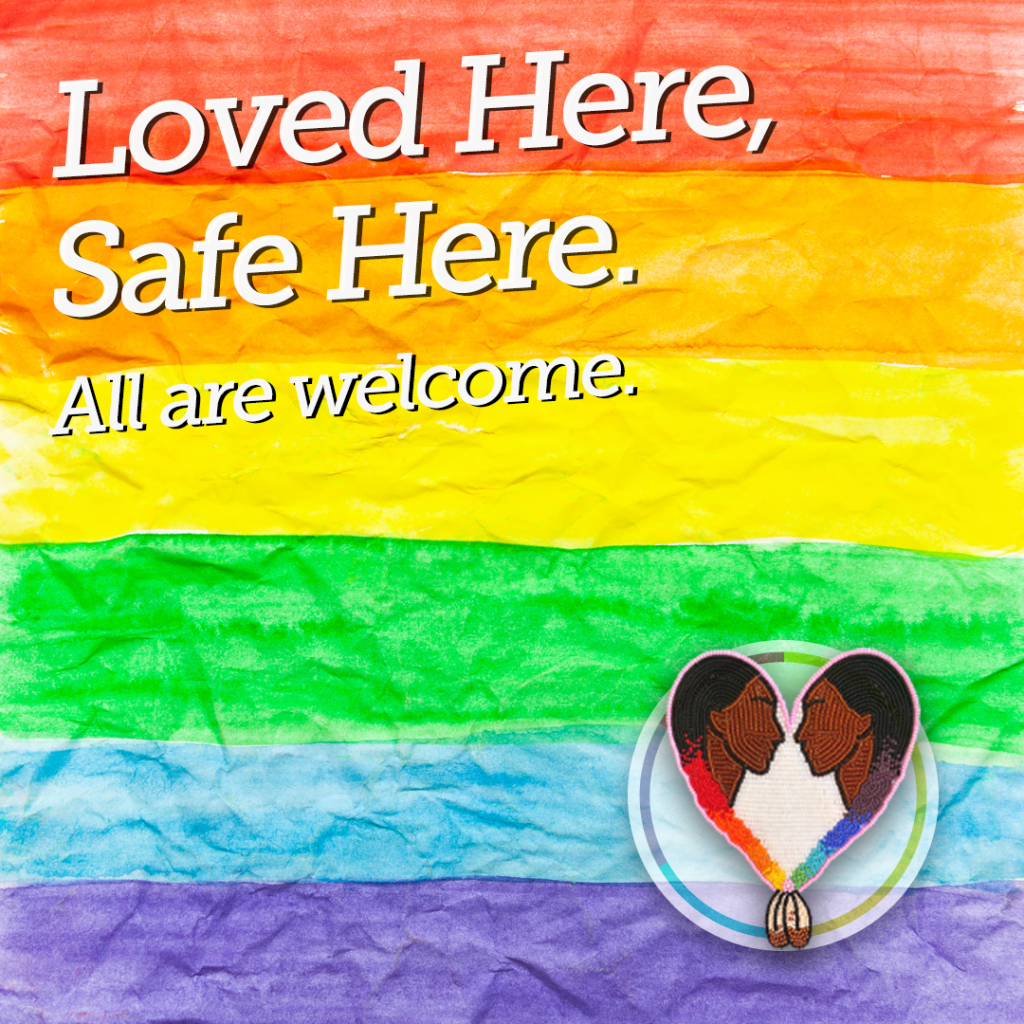
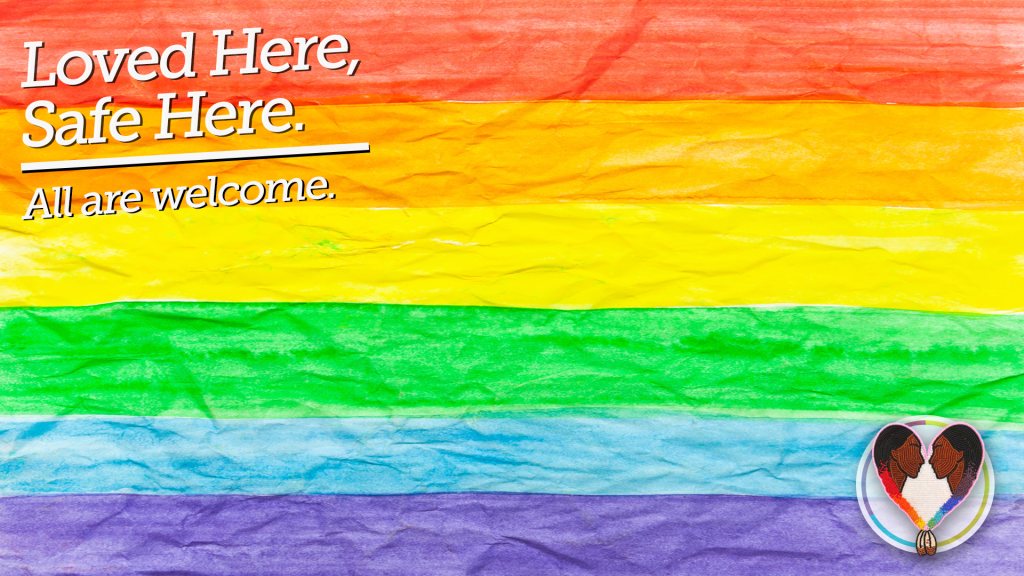
Social Marketing Campaign Materials:
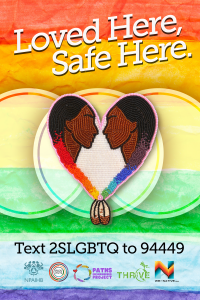
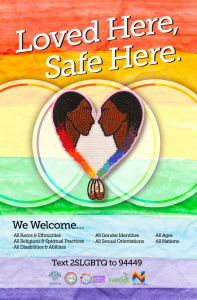
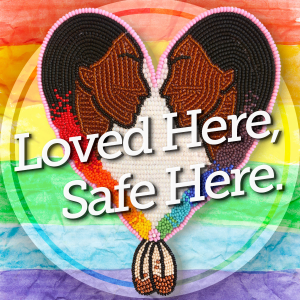
Get Yourself Tested (GYT) – The GYT campaign encourages young people to get tested and treated for STDs and HIV to protect their health and the health of their partners.
- Get Yourself Tested Poster
- Get Yourself Tested Digital Brochure
- (1) Get Yourself Tested 30-second Video PSA
- (2) Get Yourself Tested 30-second Video PSA
- (3) Get Yourself Tested 30-second Video PSA
Social Media Materials: Feel free to download and share on your digital platforms and social media channels:
- GYT Google Classroom Background image
- GYT Zoom Background image
- GYT Facebook Cover image
- GYT TikTok Background image
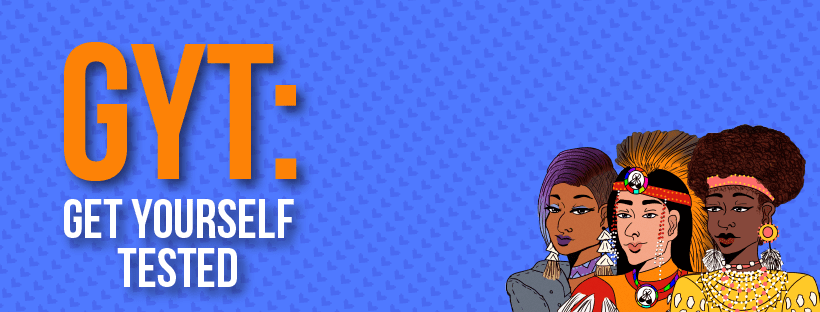
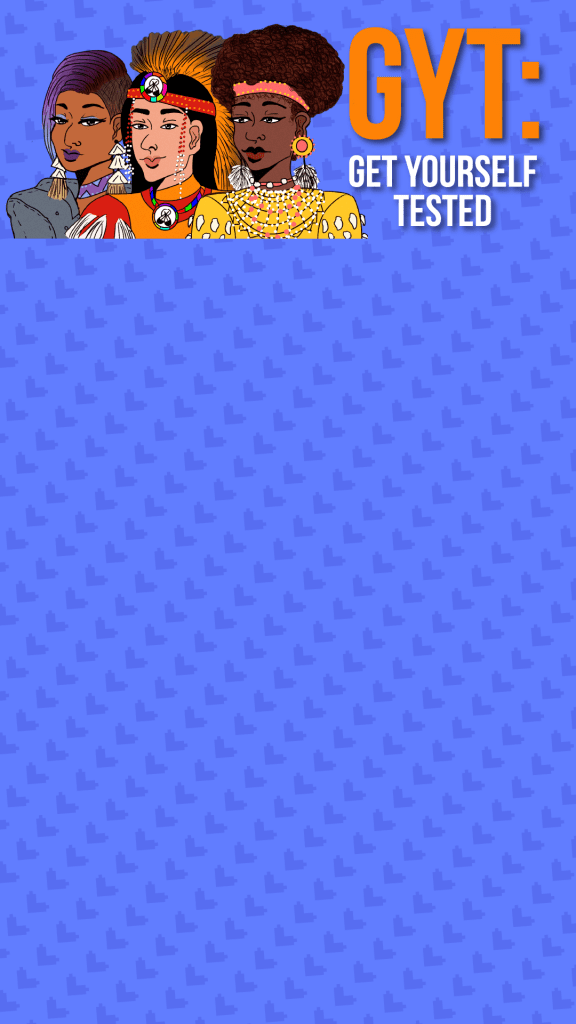
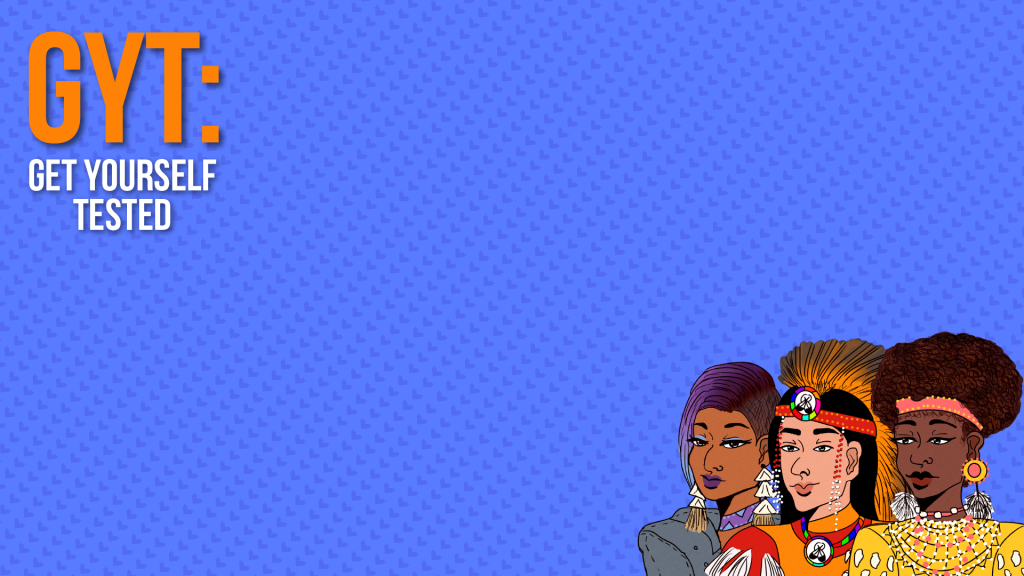
These youth-friendly materials are designed to promote HIV/STI testing, spark conversations around sexual health topics, and encourage access to We R Native (www.weRnative.org), a multimedia health resource for Native youth, by Native youth.
We Appreciate Your Feedback
Please share how you’ve used the materials in your community. Please take this 5-minute survey: https://www.surveymonkey.com/r/WYSHCampaign
To request materials, contact: WYSH Project Manager, Celena J. Ghost Dog, cghostdog@npaihb.org
